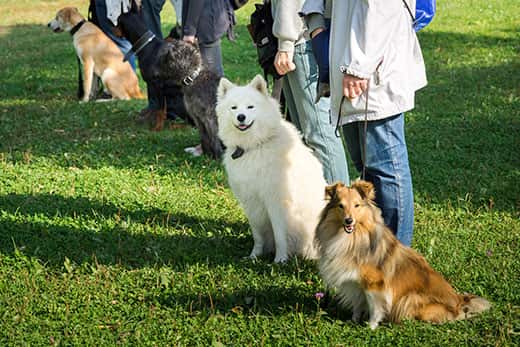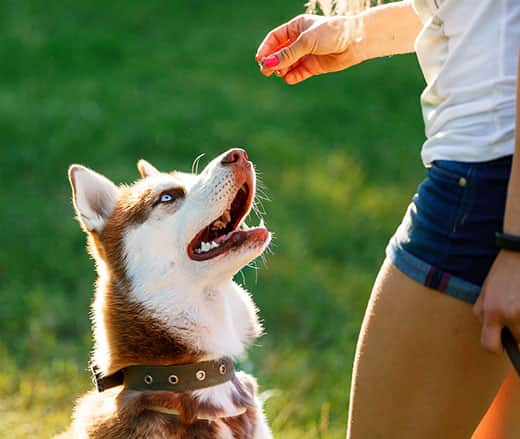
Is your dog ready for obedience training?
If you have a puppy or adult dog that needs to be taught good manners, then obedience lessons will not only help them fit in better with your life and your family, but will also teach them skills that can be critical to their own safety. Below are all the answers to your question: “What should I expect from dog training?”
Contents
Obedience School Standard Program
Usually obedience courses are held one hour a week for six weeks. According to the American Kennel Club (AKC), classes are generally categorized into classes for puppies under five months of age and classes for dogs five months of age and older. In addition to the basic commands (“sit”, “come”, “fu”, etc.), puppy classes focus on skills such as communicating with people and other dogs, teaching cleanliness, the correct way to greet people (without jumping on them) and leash training.
For older animals, obedience lessons are more often about good manners and learning the rules of behavior in the house. In addition to commands such as “sit”, “come” and “fu”, more advanced commands are learned there, including “place”, “down” and “near” when walking on a leash.
Benefits of dog training
 Obedience training provides a number of benefits for you and your puppy. First of all, he will learn to behave the way you and other members of your family need. Obedience training from an early age will prevent annoying habits like jumping on people, barking inappropriately, or chewing on everything. Teaching good manners can also help older animals break these habits, the AKC says. More importantly, the ability to approach an owner, sit still, or leave an object on command are skills that will help prevent harm or injury to your dog.
Obedience training provides a number of benefits for you and your puppy. First of all, he will learn to behave the way you and other members of your family need. Obedience training from an early age will prevent annoying habits like jumping on people, barking inappropriately, or chewing on everything. Teaching good manners can also help older animals break these habits, the AKC says. More importantly, the ability to approach an owner, sit still, or leave an object on command are skills that will help prevent harm or injury to your dog.
Of course, your dog will not be alone in his training. If you do it right, working with him to learn new skills, you will strengthen the bonds of trust and friendship between you. Plus, attending obedience classes is a great way to meet other dog owners, share fun parenting stories, and make new friends.
Does obedience training work?
The effectiveness of obedience training depends on a number of factors. The breed and temperament of your pet play a role in how well and quickly it will learn. For example, training a strong-willed or hyperactive dog will take more time, effort, and patience than training a calmer dog who wants to please you. Age also matters. For example, if your puppy is still too small and easily distracted, it may be worth putting off training and trying again when he is older and calmer.
The number one factor that determines how effective obedience training will be is you. In order for obedience lessons to have the desired effect, you should not be limited to an hour-long lesson once a week – you need to practice regularly with your dog at home. It is also important that the whole family is involved and that everyone follows the rules. For example, if a mother says that a puppy is not allowed on the sofa, under no circumstances should it be allowed there. After all, if dad or one of the children invites a puppy to lie next to him on the couch, even as a one-time indulgence, this will only confuse him and negatively affect his learning. Also, as Petfinder emphasizes, one must be careful not to reinforce problem behaviors. Sometimes you can encourage this behavior without realizing it. Examples include trying to comfort a dog when it’s whining, or giving it attention when it’s demanding it with inappropriate barks. Sequentially practicing proper training methods outside of the classroom is the only way to properly reinforce the material covered if the pet does not obey the owner.
Dog training: can I train it myself?
 Obedience lessons with a trainer are not the only way to teach your pet how to behave. You can always try to teach her the same skills she learns in obedience school on her own. Today, there are countless books, websites, and videos to help you train your puppy at home. One of the benefits of this type of training is that you can design your own course, mixing and matching approaches and training styles that work best. Self-training may be the best option if your schedule or location makes it difficult for you to attend regular classes, or if your dog needs individual attention.
Obedience lessons with a trainer are not the only way to teach your pet how to behave. You can always try to teach her the same skills she learns in obedience school on her own. Today, there are countless books, websites, and videos to help you train your puppy at home. One of the benefits of this type of training is that you can design your own course, mixing and matching approaches and training styles that work best. Self-training may be the best option if your schedule or location makes it difficult for you to attend regular classes, or if your dog needs individual attention.
If you find that obedience school isn’t right for you, but you still need specialist help, one of the many professional trainers will come to your home and work with you and your dog individually. Some training programs also include private sessions that will fit more easily into your schedule.
Or maybe my dog is too old for obedience lessons?
Contrary to the famous saying about old dogs and new tricks, pets are never too old to learn new commands and skills. Rebellious adult dogs can benefit from obedience lessons just as much as puppies can. It’s best to talk to your veterinarian about what your older pet can handle.
Another problem with training older dogs is that in their case, the unwanted behavior has been reinforced for years, if not decades. This does not mean that learning is impossible, but it can take a lot of time and patience to achieve success. When training older animals, it is important to remember that you will have to adjust your expectations according to their abilities.
Regardless of your dog’s age, breed, or temperament, if he hasn’t been trained in good manners, or if his disobedience could jeopardize his own safety, it’s time to consider taking him to obedience classes. Such training will also make your life easier, because in the end it will respond to you better. Pets like training sessions, because for them this is a moment of intimacy with the owners. So the more you train your dog, the better it will behave and the stronger the bond between you will be.





